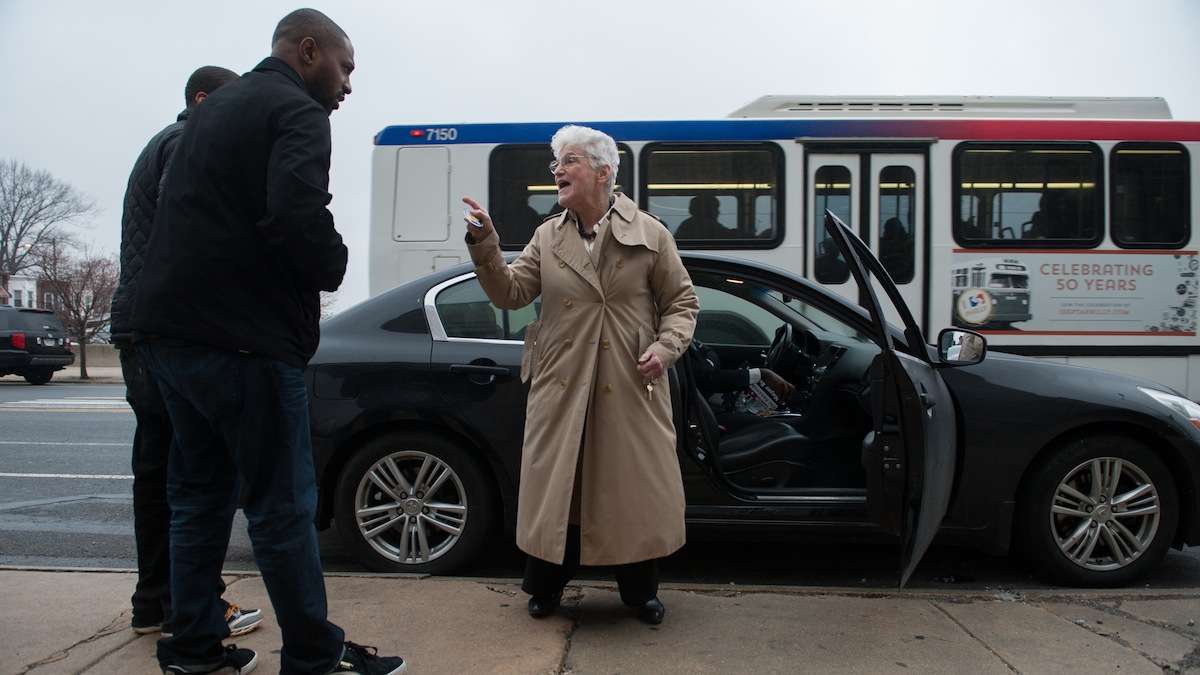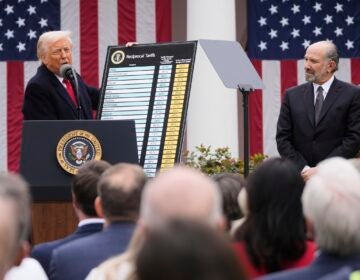Q&A: Lynne Abraham on L&I, councilmanic prerogative, protected bike lanes and more

Last week, PlanPhilly sat down with former judge and District Attorney Lynne Abraham, one of six Democratic candidates campaigning to be the city’s next mayor. Over a 30-minute interview in Center City, Abraham discussed L&I, protected bike lanes and seniors; her vision for a strong mayoralty; her plans to end (or limit) abuse of councilmanic prerogative; the changes for rapid transit on Roosevelt Boulevard, and how to fix L&I. Below are some lightly edited highlights. You can read the full transcript of the interview here.
Also read our earlier interviews with mayoral candidates Tony Williams, Jim Kenney, Nelson Diaz, and Doug Oliver.
–
On L&I:
There are lots of departments that have issues. I’ll give you an example. Department of Human Services was a basket case…
L&I is, if anything, worse than the Department of Human Services. I’d love to be able to say “but human lives haven’t been lost,” but human lives have been lost, because of their negligence, incompetence.
The permitting function can certainly be more streamlined. You don’t have to feel like you’re like Sisyphus in the basement of the Municipal Services Building. The inspections department should be under an engineer – a licensed, certified engineer who will know exactly what to do.
If we have to, do everything we can to just tear the department down and just build it back up again.
The L&I department has been serially investigated for years, and decades even. And I can’t say what’s the problem but I know this is something that will be a huge, huge priority for me
On schools:
If there is any candidate that promises that they’re going to fix the school system in their first four years, its absolutely untruthful and unworkable. We didn’t get this way in four years, and we’re not going to rectify it in four years.
On where quality of life issues stack up against “major” issues like education, crime, jobs, etc.:
To the people living in the communities, their issues are huge to them. They feel that government has not paid attention to their issues and needs. These things fester and grow. People become frustrated, disillusioned, and tuned out. These groups want their own issues paid attention to. And there is nothing that I’ve seen or heard that’s really small.
So, I don’t think any of these issues are trivial. Do they stack up in the sense of import to the whole world’s great big issue? Probably not but to them they are really important and they’ve been overlooked and neglected and they’re working with the same problems and obstacles they’ve always worked with.
On protected bike lanes for Market Street and JFK Boulevard, and senior citizens:
I don’t know if I’d support a protected bike lane unless we can protect senior citizens [many of whom live in the apartments nearby]. How do you make senior citizens aware that there is a bike lane when many of them don’t see particularly well or hear particularly well, and they may see the white lines but they may not stop to look both ways, so they don’t walk across the path of the bike lane.
I’m not against it as a concept, I support it but my question is, how are you going to put it in that neighborhood without older folks falling or getting hit or getting injured or killed?
You’re gonna have to sell me, as the mayor, to make sure that those senior citizens don’t feel that their lives are endangered every time they step out on the street by these bicycle users who go very, very fast.
I want to know what the people that live in those buildings, whether they were consulted about that and how do they feel. If they are consulted and they go with it, God Bless.
On her vision for a strong mayor’s office:
I’ve said quite clearly that our charter is based on a strong mayor form of government. The balance of power up until relatively recently, has been that the mayor is the mayor and that the legislative body is the council. So he’s the executive – soon to be she – and they are the legislative body. But somewhere along the way, the council president and some of the council people think that the best way to run the city is to usurp the mayor. You can’t say it any plainer than that.
Mayor is the chief executive of the city. It’s the CEO.
Jim Kenney said, “Well I think the mayor ought to be a point guard.” Is he joking or what? I’m not here to be a point guard. I’m here to be the CEO.
On her plans to tackle councilmanic prerogative:
It isn’t engraved in stone.
And that’s going to be a hard lift. I can tell you, I’m not going to be spending a whole lot of time doing that, because my time is going to be better spent on… the important things [like job creation, school funding, etc.].
So, councilmanic prerogative is going to be one of those things that’ll probably be around, but, y’know, none of those council people are elected to be the head of a fiefdom.
The mayor can use her influence to tell the public and inform the public what’s happening. And to try to limit the extent of councilmanic privilege.
On the mayor’s role in shepherding along major transportation proposals like capping I-95, extending the Broad Street Line or bringing rapid transit to Roosevelt Boulevard:
first of all, a lot of those things are aspirational. Well, ok, I talked about Roosevelt Boulevard. Somebody said “Well, we’re gonna build a subway up Roosevelt Boulevard.” I don’t think so.
Are we really going to be able to accomplish it? Not probably anytime soon.
Is it something we might want to think about for the future and plan for 10 or 20 or 30 or so years out? [Yes.] So, you do have to plan for later.
On why she’s grateful there have been more forums than debates:
We… get a chance to hear an individual’s point of view on a given issue. There’s not so much of that “Well, you’re mother wears army boots!” “No, she doesn’t, she wears tennis shows! It’s your mother that wears the army…” I mean, it’s so silly, and so boring, and so non-productive. It doesn’t give the voter a chance to understand what is that person thinking about my issue, or this issue?
WHYY is your source for fact-based, in-depth journalism and information. As a nonprofit organization, we rely on financial support from readers like you. Please give today.





